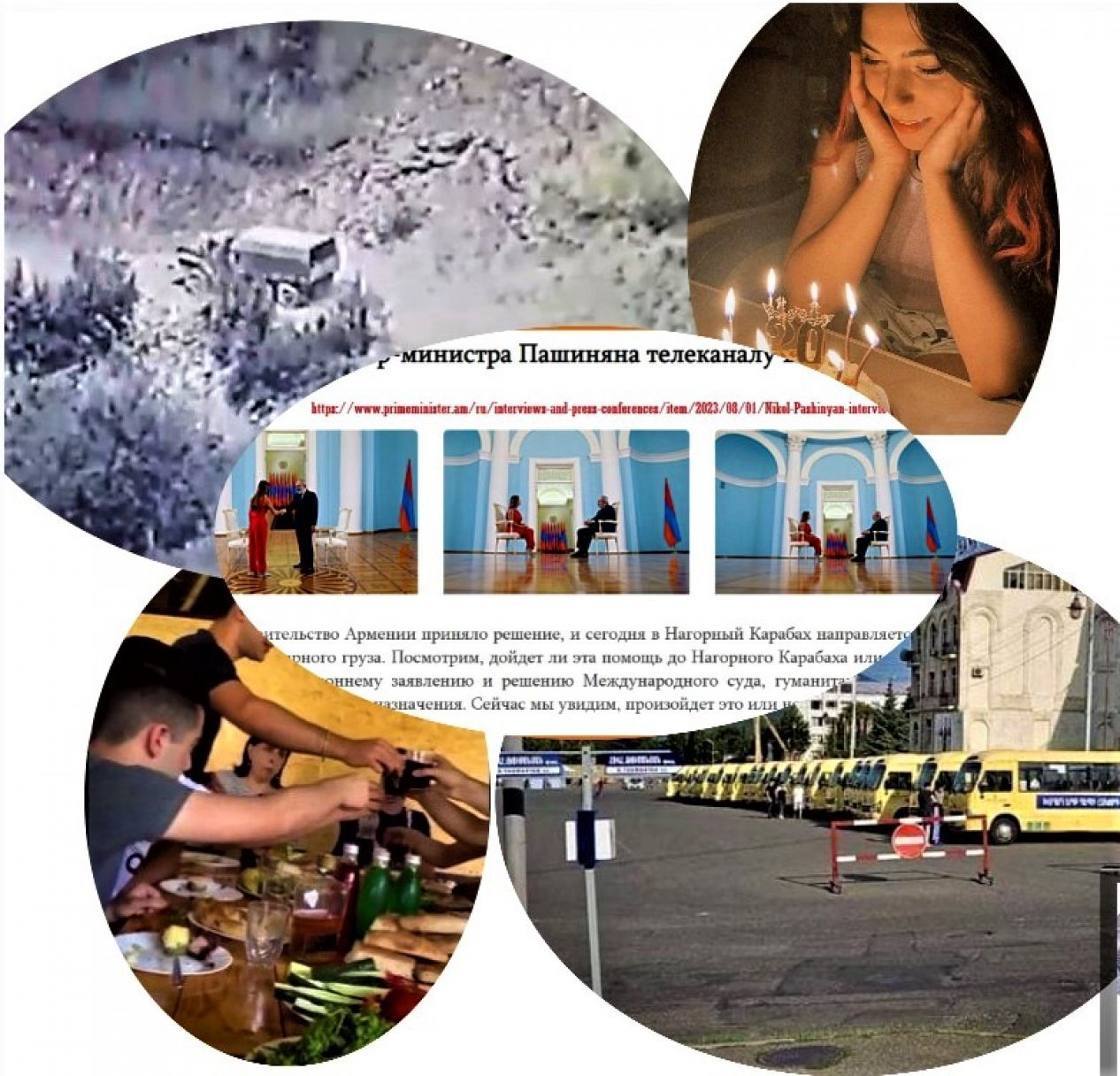
Armenian Prime Minister Nikol Pashinyan spoke about the "humanitarian crisis", the "blockade" in Karabakh, the difficulties in providing natural gas and electricity to local residents, and the "400-ton humanitarian aid" convoy standing at the border in an interview with Euronews TV channel.
Faktyoxla Lab. has clarified these claims.
First, let’s consider "400 tons of humanitarian aid" that Armenia wants to send to the Karabakh economic region of Azerbaijan without permission. Pashinyan said in an interview to Euronews channel that "yesterday, the Armenian government made a decision to send aid to Karabakh. Today, 400 tons of humanitarian aid is sent to Nagorno-Karabakh. Let's see if this aid will reach Karabakh or not. That is, according to the Tripartite Declaration and the decision of the International Court of Justice, humanitarian aid must reach its destination. Now we'll see if that happens."
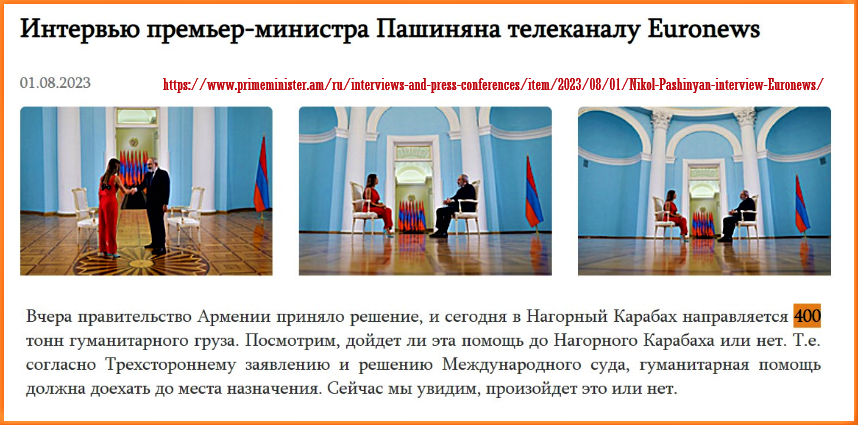
The point is that Pashinyan said at the meeting of the Cabinet of Ministers on July 27 (the day he gave an interview to the Euronews TV channel - ed.) that the Armenian government sent 361 tons of humanitarian aid to Karabakh, but Azerbaijan does not allow these cargoes to the territory of Karabakh.
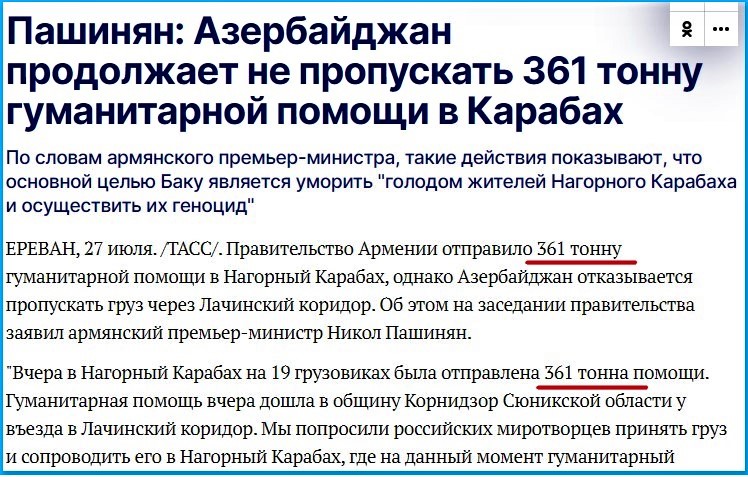
Apparently, Pashinyan gives two different figures ("400 tons" and "361 tons") about the weight of the illegal cargo sent to Karabakh. This is more than frivolity, but false information is given different meaning in different circumstances. If this PR-campaign started by the Armenian side was real, the prime minister would not have revealed one figure about the weight of the cargo sent at the meeting of the "cabinet" and another figure in an interview with a well-known TV channel. Perhaps, the day by day increase in the number of Armenians living in Karabakh (before, they say 90,000 then 120,000 and now 15,000) has a mystical connection with the increase in the volume of humanitarian aid sent to Karabakh.
- Among the claims made by Pashinyan during the interview, the idea that "Karabakh’s natural gas, electricity and heating (?-ed.) energy has been cut off by Azerbaijan" drew attention.
Let's clarify these ones, too. Over the past 7 months, the Azerbaijani media, independent Telegram and YouTube channels have repeatedly exposed the false information spread by the Armenian side about the power outage in Karabakh. Just to remember, we can list a few facts.
For example, Marut Vanyan, an Armenian blogger living in Khankendi, shared this photo to show how the people of the city are suffering under "blockade" conditions and in the dark.
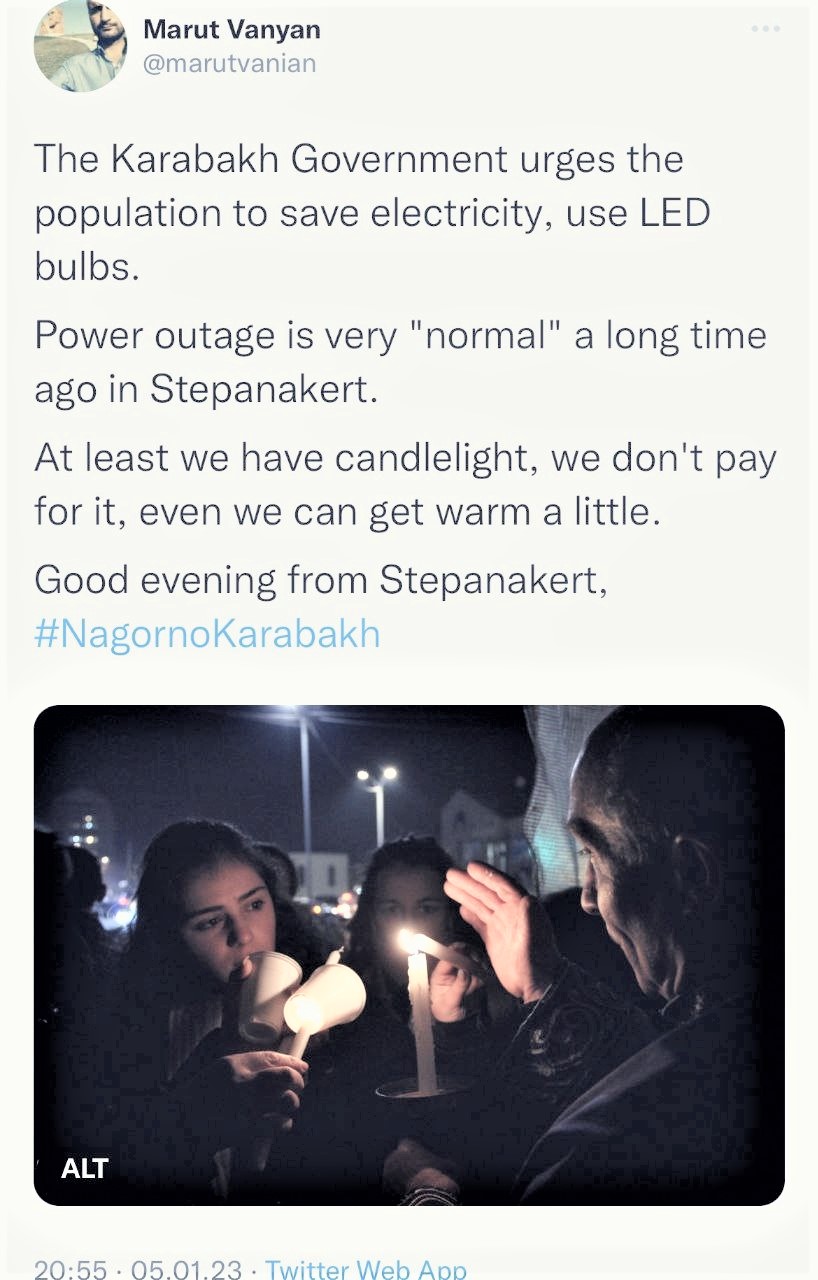
The setting scenario of these people gathered by candlelight was revealed by the brightly burning light poles and lamps in the background.
In addition, the photo of the students who helped their teachers who gave a concert in Khankendi by shining light with flashlights also suffered the same fate. For some reason, bright light projectors were placed on the stage to show the children helping their teachers in the dark hall.
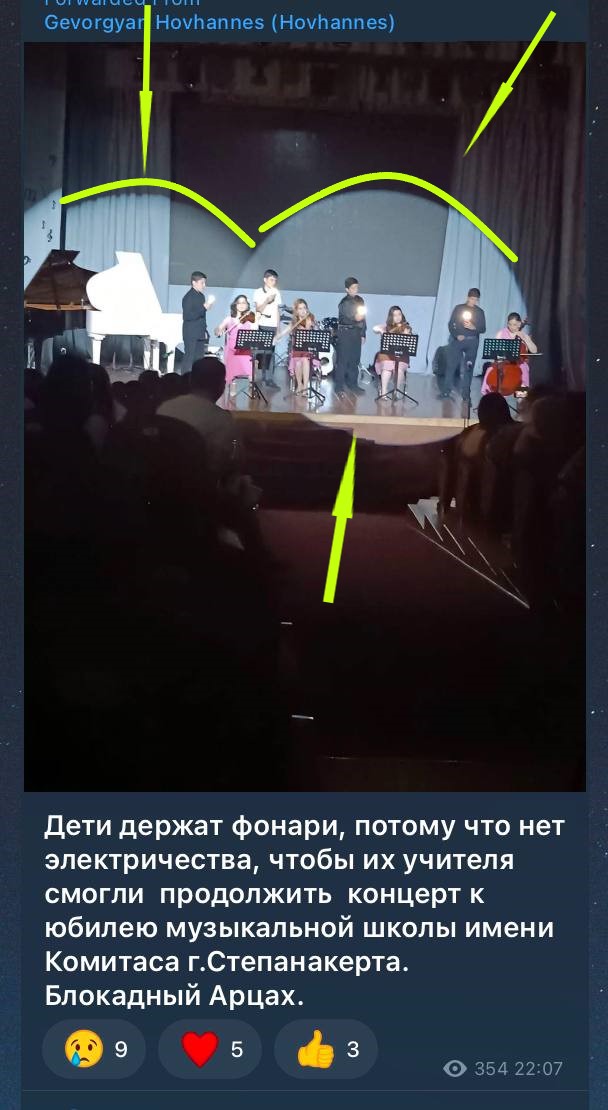
Other false news about the lack of electricity in Karabakh is revealed by lavish wedding celebrations, birthday events, various parties, and photo and video sharing of the daily lives of the city's residents in Khankendi. The number of such exposure facts is thousands.

- Let's clarify Pashinyan's claim that Azerbaijan is blocking the transfer of natural gas to Karabakh.
As a result of the investigation, it became clear that the gas supply in the areas where the Russian "peacekeepers" are temporarily located is carried out by Armenia, and the mentioned areas are not integrated into the gas supply system of Azerbaijan. Therefore, it is possible to state unequivocally that the interruption in gas transportation in the region is not related to Azerbaijan.
Gas supply to Khankendi was carried out as part of the unified gas network of Azerbaijan until a few years before the occupation of the Azerbaijani lands by the armed forces of Armenia, to be more precise, until 1990. During the occupation, the Armenian Armed Forces and terrorist groups completely destroyed all the necessary infrastructures in Karabakh, including the gas industry. Gazprom Armenia, a subsidiary of the Russian company Gazprom, which took over the fuel supply of the region that was left without gas due to the failure of the Aghdam-Khankendi gas line, built a new gas line to Khankendi by connecting the existing gas system network to the Gorus-Lachin-Khankendi line.
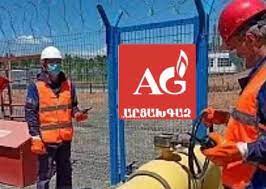
Gazprom Armenia transmits gas to Khankendi through the Gorus-Lachin-Khankendi line of the Baku-Yevlakh-Aghdam-Khankendi-Lachin-Gorus-Nakhchivan gas pipeline, which was built by Azerbaijan at the time and is currently in operation. Although that pipeline is parallel to the Lachin corridor, it passes through the zone of responsibility of the Russian "peacekeepers" and Azerbaijan's gas industry body has limited opportunities to physically intervene in the pipeline. link
Apparently, since the Baku-Yevlakh-Aghdam-Khankendi gas route was deliberately disabled by the Armenians, the gas transportation to Khankendi is transferred through the Khankendi-Lachin-Gorus line, which is in the hands of Gazprom Armenia. As these areas generally belong to the zone of responsibility of the Russian "peacekeepers", the physical intervention of the employees of the Azerbaijani gas administration is impossible, and the interruptions in the gas supply at different times have nothing to do with Azerbaijan. Therefore, by committing various provocations, Armenia is purposefully trying to discredit the plans to take over the gas supply of Khankendi by Azerbaijan and build a new gas supply system.
Looking at the chronology of the disruptions in gas transportation from Russia to Armenia in recent months, we see that gas transportation from Russia to Armenia was interrupted 4 times on December 22, 2022, February 18, 2023, May 1, 2023, and July 9, 2023 due to various reasons. With this, it becomes clear that the problems in gas transportation from Armenia to Karabakh are directly the fault of Gazprom-Armenia.
- Finally, Pashinyan claims that currently tractors are not working to collect agricultural products from the fields, there is no equipment to collect grain, because there is no fuel.
We want to clarify Pashinyan's claim with a replica we found in the Armenian media. In one of the Armenian telegram channels, the leadership of the terrorist regime in Karabakh was addressed:
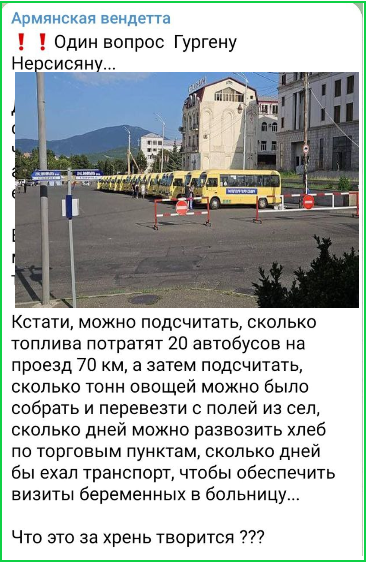
"You all say that there is no fuel to deliver vegetables from villages to Khankendi, but there is fuel for a peaceful bus rally??? If you are not an entrepreneur, then at least you provide the bus and fuel. By the way, you can calculate how much fuel will be consumed by 20 buses to travel 70 km, and then you can calculate how many tons of vegetables will be collected from the fields and transported from the villages, and how many days the bread can be delivered to the shopping centers. How many days will the transport take to ensure that pregnant women go to the hospital․․․
What is happening???"
In this opinion, many bloggers and journalists, distinguished by their hatred towards Azerbaijan, have addressed similar questions.
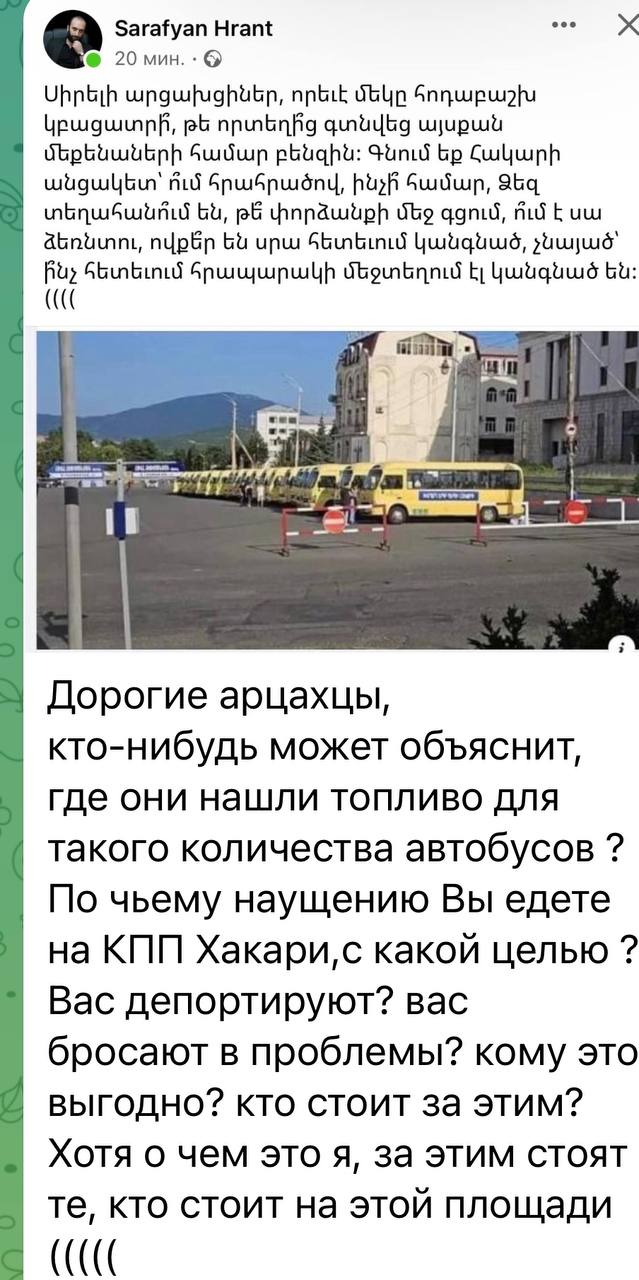
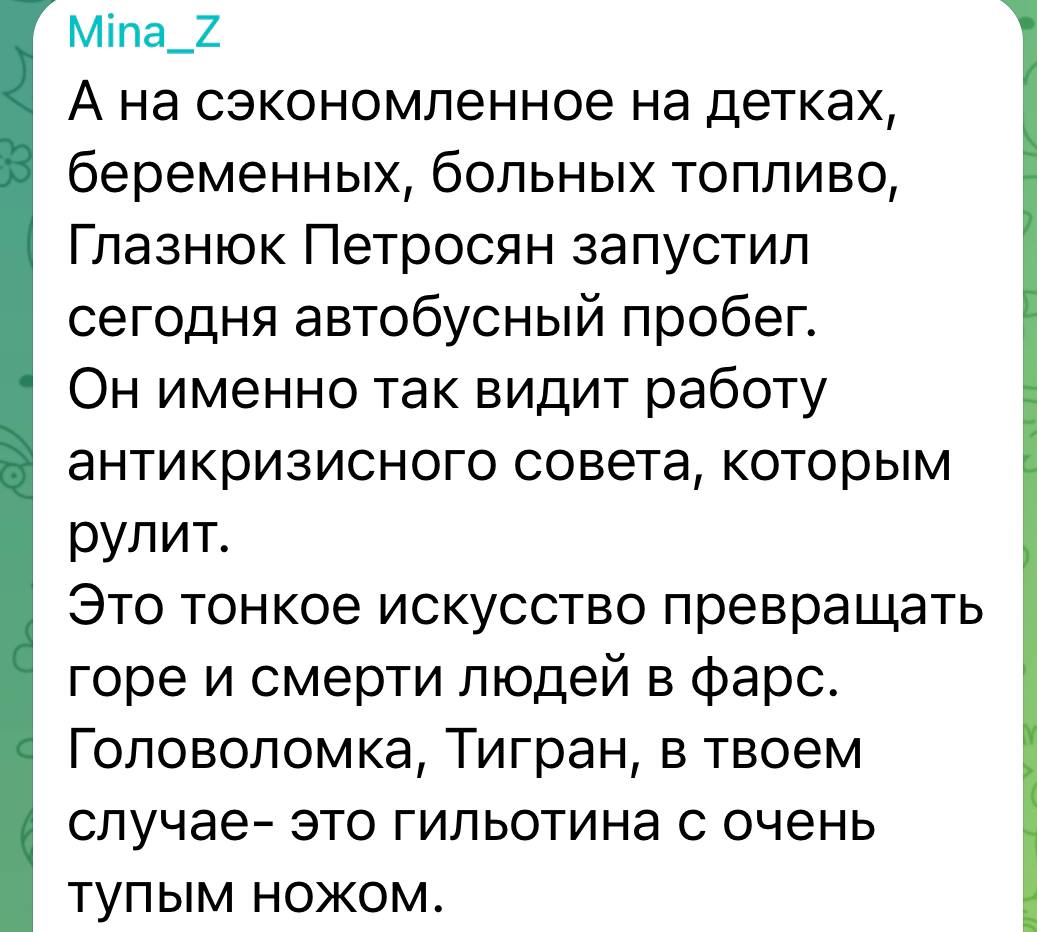
In this link, you can follow the non-stop buses operating in Khankendi city.
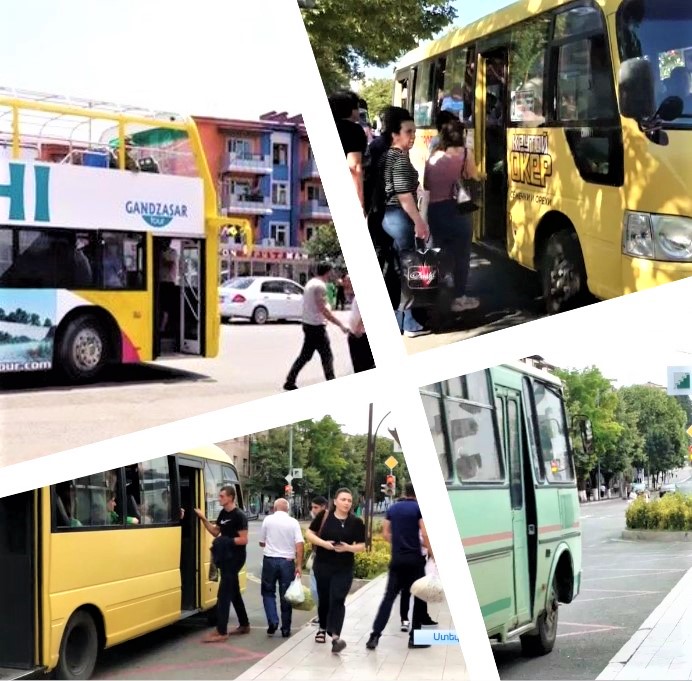
Recently, videos of at least 2-3 trucks carrying weapons, explosives, and other military products have been circulating in the territory of Azerbaijan, accompanied by the Russian peacekeeping contingent. Although we have to repeat the opinion of the Armenian blogger, we would like to ask whether the terrorist regime, which finds fuel for illegal transport of weapons and ammunition, for carrying out a bus campaign, cannot find fuel for a machine for harvesting grain?
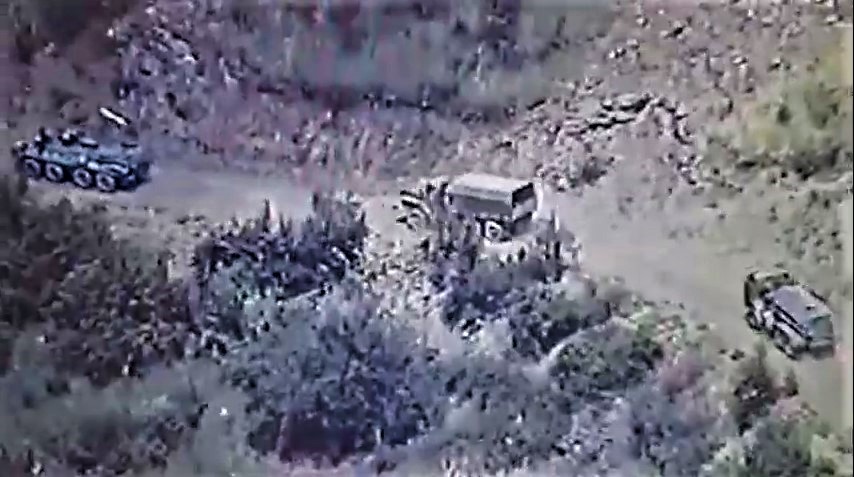
Conclusion:
In an interview by Nikol Pashinyan with Euronews TV channel:
- The allegation that Azerbaijan prevented the interruption of natural gas transmission to Karabakh is a lie. Gazprom-Armenia is responsible for the transmission of natural gas, and the stoppage of gas transmission is due to a technical fault in Gazprom's lines and a deliberate shutdown to create discontent.
- As for the claim about the lack of electricity in Karabakh, the lavish wedding and birthday celebrations held in Khankendi, photos and videos from various events fully expose Armenian propaganda.




















